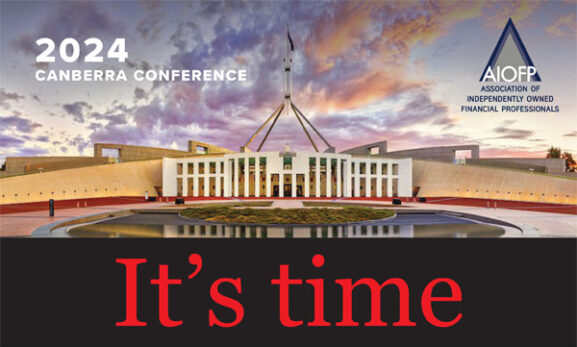Lessons from the past are lessons for the future.
The greatest lesson I have learnt over the journey is if you stay true to your clients and always act in their best interests you will eventually succeed despite some often short term pain. I experienced this in 1989/90 and again recently.
In the last week we had contact from Treasury about seeking the AIOFP’s view on QAR and related industry matters. This is the first time the AIOFP has been officially approached to assist Treasury, after 25 years of surviving/agitating in the shadows of the FPA/AFA, the AIOFP is finally getting official recognition its members deserve.
In 1989/90 my Advice practice was involved in a Friendly Society fraud where the CEO/CIO transferred $30 million into their own bank account and tried to justify it. We had a choice of turning our backs on our clients or face public embarrassment, cooperate with ASC and try and get the money back. Back in those days there was no AFCA, no class actions, no mandatory PI or internet to rally support, individuals trying to take legal action against institutions or advisers was problematic.
We made the decision to call a public meeting of the clients, we invited the media which damaged our business reputation but eventually all clients got their money back plus interest, the perpetrators went to jail and the ASC thanked us for cooperation in the Courts as witnesses. As a result, all clients stayed with our practice and I learnt a great lesson about ethics and having empathy for Advisers in similar situations.
The other message is clear, if you act in the best interests of your clients [or members] at all times, you will eventually succeed despite short term pain.
This is the theme we selected in 2019, we came out strongly against the Government in favour of Advisers and their clients. We got short term criticism from some sections but eventually won by standing by our members, the Government was removed, and you know who lost his seat.
This is the big mistake the FPA/AFA made by supporting Minister O’Dywer with LIF/FASEA in 2016 and not their Adviser members. They neglected their best interests and supported the Institutional lobby who had lavished them with millions of cash donations and notoriety in Canberra.
What astounds me is they have done it again by supporting an Institutional friendly QAR outcome over what’s best for consumers and Advisers. What or who do they actually stand for?
History certainly repeats itself…no wonder they are having to merge due to member abandonment/cashflow problems and the FSC lost all the Insurers to their own Association start up – Coalition of Australian Insurers [CALI]. The term Karma comes to mind for this threesome.
My advice career started in late 1979 and finished in late 2001 when AIOFP moved out of my practice into its own premises, I do miss the contact with clients but not today’s compliance impost. Back then there were no ‘Dealer Licenses’ you were licensed to individual groups like AFT, Telford or Equitilink, agencies with any Life Company or Friendly Society you wanted and no such thing as a SOA, giving a written plan was optional. Somewhere in the middle of then and now is the answer to the best structure.
No doubt the most pivotal political event to impact on the Advice industry over the past 44 years has been PM John Howard cancelling the Defined Benefit Super benefit fund for all politicians in 2004. Grandfathered of course for himself and others, it has made it very difficult for all Political parties to recruit quality candidates into Parliament and the results over the years are very evident. There have been some very ordinary Politicians pontificating about and influencing our industry over the journey.
It has also opened the opportunity for third parties to ‘influence’ political outcomes with guaranteed jobs post politics, let’s hope the new ICAC is effective. I think Politicians should get a pension/higher wages with conditions to attract quality candidates and we can’t have the head of the public service on double the wage of the PM.
The last political issue are donations, they should be banned and the tax payer should fund all political parties ensuring they are acting in the tax payers best interests not the donors. The circa $100m election pool spend is a ‘drop in the ocean’ to our debt and will save plenty by cleaning up the conflicts and manipulations.
A bizarre situation today is ASIC directly invoicing Advisers who are on a mission to put Advisers out of business, what a strange conflicted arrangement. An analogy is the Police Force directly invoicing the public so they can either put them into jail or protect them. Surely all funding of Government services should be from a generic central source, this is the work of Politicians not ASIC.
The other bizarre phenomena are Government dictating terms to business on commercial arrangements between consumers and Advisers including the Consent Forms. These two situations and the entire compliance regime relates directly to the above issue of poor Politicians making poor decisions.
There is ample evidence to suggest the infiltration of the 4 major Banks into Advice and Wealth Management has not been a great outcome for consumers. It all started with CBA’s purchase of Colonial First State and NAB with MLC in 2000, followed by Westpac’s purchase of BT in 2002 and ANZ with One Path in 2010. The general performance and cost of their funds have been poor, their vertically integrated advice models were designed to confuse consumers and s923A [the definition of independence of an Adviser, lobbied by the Instos and fundamentally flawed] assisted their cause. This is why we are against a best interest’s duty being replaced with a good advice concept, consumers cannot afford a repeat of this past duping.
Advisers should stay in Advice exclusively and not be manufacturers, conversely manufacturers should stay out of advice but be permitted to have staff giving internal product information to clients. Something must be done about the FASEA exam and the dramatic affect LIF has had on the Risk sector, we need the Risk only Advisers back and supported.
In 1996 the Keating Government were kind to the emerging Industry Superannuation Funds movement with favourable legislative disclosure treatment, they have been positive for the industry/consumers with low fees and generally good performance. It is rather ironic that Industry Funds have been highly critical of the Banks vertically integrated highly conflicted advice model for over 20 years but now find themselves implementing the same structure when the Banks have left the sector. The fact that all members pay for an Advice service and generally less than 10% use it needs to be addressed.
The presence of over 13 Associations meddling in the Advice industry when most are not relevant must be rectified. The JAWG concept looks very much like 2 discredited Associations FPA/AFA surrounded themselves with other non – Advice Associations to leverage off their credibility. We need no more than 3 Associations in the advice space, we suggest the SMSFA, Stockbrokers/Advisers and the AIOFP.
The digital age is well and truly with us but humans will always want to deal with other humans for personalised advice direction for the foreseeable future. My international contacts keep saying that digital robo advice is largely unsuccessful around the world……
I think the Liberal Party is no longer a political threat to the Advice community. They have admitted they got it badly wrong and Ms Levy’s Report discredited many of their initiatives over the past 9 years.
Despite all of the above I think the Advice industry is well positioned to flourish going forward with a more educated consumer now appreciating the professionalism, quality and performance of Advisers generally.
Regards
Peter Johnston



